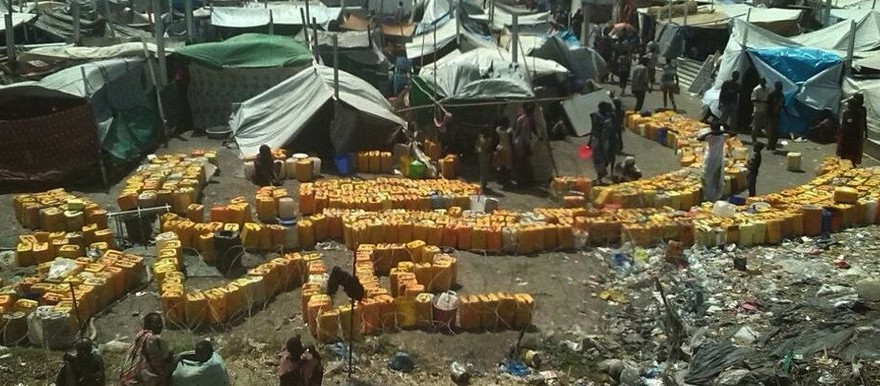The water supply for up to 30,000 people living at the UN base in Malakal, Upper Nile, is ‘extremely strained’, the United Nations stated on Friday, citing an increase in new arrivals and disruption of water and sanitation works due to fighting.
According to the latest UN situation report produced by the Office for the Coordination of Humanitarian Affairs (OCHA), published on Friday, “Insecurity in Upper Nile resulted in major gaps across four key sites and increased needs,” including at the Malakal base where there are estimated to be more than 21,500 displaced and perhaps as many as 30,000.
Aid agencies last weekend evacuated most of their personnel from the UN base in Malakal, immediately after the airstrip reopened to traffic for the first time since the capture of the town by opposition fighters on 18 February.
These organizations “are advocating for the return of aid workers to Upper Nile State to restore water supply services for up to 30,000 people in Malakal UN base and at least 60,000 displaced people across the state,” says the latest OCHA report.
The International Organization for Migration (IOM), which is the leading water and sanitation provider in various IDP sites in Upper Nile, including Malakal, Melut, Wau Shilluk, Rom and Dethoma, stated in its own update Friday that the current water standard at the Malakal base is 11 litres per day, compared to a minimum humanitarian standard of 15 litres per day.
“IDPs are unable to leave the Protection of Civilians area to fetch water from the river as they did before the fighting,” the organization noted, adding that for this reason it constructed a pipeline from the river to the base.
In terms of latrines, there are currently 199, which is approximately 1 latrine per 108 persons. According to the aid agency, “Construction and decommissioning of latrines was put on hold for six days due to the fighting, ad there is an urgent need to resume these activities.”
IOM disclosed also that garbage disposal is being inhibited by insecurity because “drivers of the refuse collection trucks do not feel secure taking the trucks out of the UNMISS base to the dumping sites.”
Farther to the north, meanwhile, “new arrivals into the Melut UN base increased to over 1,000 people, amid fears of a possible attack on Paloich,” OCHA stated. “Humanitarians are mobilizing additional resources in anticipation of an increase in new arrivals into or near the UN base in Melut.”
Earlier this week displaced people in Melut reported to Radio Tamazuj an absence of aid especially food, saying that it appeared most aid workers had left. But according to the latest UN report, relief supplies have recently been delivered to Melut in the form of standard packets of “non-food items.”
New displacements are reported also in Warrap and Jonglei, especially in Bor South County after fighting in Gadiang, about 80 km north of Bor, on 23 February. Aid agencies are “reviewing needs in anticipation of the number of displaced people increasing to 10,000 in the next three months.”
“People continued to move from Duk and Twic East Counties, Jonglei to Minkamman in Awerial County, Lakes State due to insecurity. Eight sites of displacement were observed between Bor Port and Panpandiar with an estimated 2,000 people mostly women and children,” stated the UN coordination agency.
In Warrap State, local authorities reported that more than 3,000 people, mainly women and children, were displaced in Alabek and Aliet in Tonj North County after an attack early February. Some 2,000 people were also reportedly displaced in Akop Payam by a cattle raid attack on 18 February.
In terms of health services, the UN pointed out that in Unity State there is no longer any functioning referral hospital. Aid responders in the more stable northern county of Pariang are setting up a health facility that will function as a referral unit, “providing surgical capacity and emergency obstetric and newborn care.”
Photo: A photo taken by an aid worker in Malakal shows a queue of jerrycans at a water point, 22 February 2014 (Twitter/James W. Cousins)
Relaged coverage:
Key humanitarian updates, 25 Feb.
Key humanitarian updates, 23 Feb.
Key humanitarian updates, 19 Feb.




